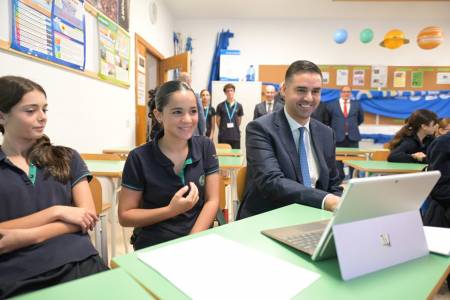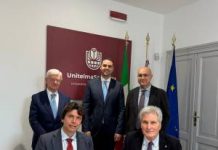Students from Malta and Ethiopia engaged in a series of online lessons promoting intercultural understanding and ethical awareness, as part of the Connecting Classrooms Project, a Malta-led international initiative supported by the United Nations.
Deputy Prime Minister and Minister for Foreign Affairs and Tourism, Ian Borg, joined one of the final lessons of this project, at San Andrea School, this week. He commended the students and educators for their efforts to strengthen a culture of integrity and global citizenship through education.
“Your voices matter. The questions you ask, the values you stand for, and the choices you make shape the future of our communities,” Dr Borg told the students, as he encouraged them to “keep learning, keep leading, and keep believing in the power of integrity to guide you, to inspire others, and to build a better world.”
The Ministry for Foreign Affairs and Tourism is leading the Connecting Classrooms Project as part of its efforts in international development, in collaboration with the Ministry for Education, Sport, Youth, Research and Innovation, the Faculty of Education at the University of Malta and the United Nations Office on Drugs and Crime (UNODC).
Students from four Maltese schools — San Andrea School, St Nicholas College Secondary School Dingli, St Clare College Pembroke, and Mater Boni Consilii School Paola — are participating in the initiative, connecting with partner schools in Ethiopia through synchronous and asynchronous exchanges. Using innovative tools from UNODC’s GRACE Programme (Global Resources for Anti-Corruption Education and Youth Empowerment), students explore themes of ethics, integrity, tolerance, and anti-corruption.
In this week’s live session, the students discussed ethical challenges, shared reflections on fairness and respect, and learnt how ethical values are understood across different societies. The session was also attended by senior officials from the Ministry for Foreign Affairs and Tourism, together with Dr Lucianne Zammit, Ethics Coordinator at the University of Malta’s Faculty of Education and Mr Roger Tirazona, Head of the Ethics Department within the Ministry for Education, Sport, Youth, Research and Innovation.
Malta has been at the forefront of these international efforts, with Maltese academics playing a key role in adapting UNODC learning materials for Malta’s national Ethics curriculum, embedding the values of integrity, civic responsibility, and respect for diversity across all levels of education. With the Foreign Ministry’s support, last year, Malta’s leadership in this field was also showcased to the African Union.
Educators from Malta have also taken part in specialised UNODC training, equipping them to apply and contextualise global integrity frameworks in local classrooms. This collaborative model, integrating curriculum innovation, teacher development, and cross-cultural student engagement, is expected to serve as a blueprint for similar initiatives worldwide.
The Connecting Classrooms Project supports Malta’s efforts to advance the United Nations Sustainable Development Goals (SDGs), particularly Goal 4 (Quality Education) and Goal 16 (Peace, Justice and Strong Institutions), reflecting the country’s broader commitment to integrity-based education and international cooperation.
The project will continue with further interactive exchanges, culminating in a closing event where students will share their reflections on how this intercultural learning experience has shaped their understanding of ethics in a global context.
Photo: MFT
![]()








